- Home
- Blake Banner
To Rule in Hell Page 11
To Rule in Hell Read online
Page 11
“You were in love with her.”
“I probably still am. I probably always will be.”
“So she broke up with you?” She was frowning.
“No. But her work, her war against Omega, that takes up the whole of her life. There is no room for anything else.”
“That’s sad. Are you bitter?”
I had once asked myself the same question. After a moment, I nodded. “Yeah, I’m bitter. But I haven’t quite lost my humanity yet.”
“That’s why you want to get out of the fight.”
“So as not to lose my humanity?” I thought about it. I thought about Abi, Sean and Primrose, Kenny and Rosalia. I thought about Independence, and my house in Weston, and I wondered what made those things increasingly important to me. Were they as close as I could get to roots? Roots that could tap into my humanity?
“Maybe you’re right,” I said at last. “You and Marni, and Gibbons, are trying to save humanity. I’m just trying to save my own humanity.”
At midday she made us hotdogs and we cracked some cold beers. We sailed through the afternoon, driving ever south of east. Evening fell and the sun set behind us, putting fire in the sky and spilling blood on the sea, until both were quenched and absorbed by the dark blue of night. Then the moon rose ahead of us, waning now, but still huge and bright, casting an eerie, almost green light over the ocean. And about her, an absurd number of stars pierced the sky.
At one in the morning Cyndi went below to sleep. At two she came out again with a bundle of blankets, and settled herself on the floor of the cockpit so she could lie and look at the stars. I gazed up at the stars with her for a while, and when I looked at her again, she was asleep.
The sun rose at seven thirty, the wind picked up and so did the swell. Soon afterwards Cyndi awoke, stretched and staggered below again with her bedding. At eight she came out with coffee and a plastic bag of stale croissants. We didn’t talk. I ate and drank and scanned the horizon.
At half past eight I spotted a large, white schooner dead ahead. I estimated her at about one hundred feet, she was Bermuda rigged and lying at anchor. Fifteen minutes later we were close enough to see two figures on deck, watching us. One was a rotund man in white pants and a blue blazer, watching us through a telescope – there was no question, he was obviously Gibbons—and the other was Marni: slight, in jeans and a sweatshirt. The schooner’s name was written in large, gold letters along the prow: the Magna Carta. As we drew closer, Marni waved and I waved back. Gibbons closed his telescope and walked away to the cabin. After that, Cyndi helped me lower the sails, and we used the engine to come within ten yards.
There we dropped anchor, launched the dinghy and I rowed us across to where Gibbons had lowered a retractable ladder. I made us fast, Cyndi climbed aboard and I followed.
To say the meeting was awkward would be like saying Mount Everest was substantial, or that Genghis Khan was naughty. The four of us stood on the deck looking at each other for four of the longest seconds I have ever lived through—and I’ve lived through some very long seconds. Finally, Gibbons held out his hand to Cyndi and said, “Senator, it is very good of you to come and see us in these, somewhat unorthodox, circumstances.”
She shook his hand and slipped seamlessly into the role of politician. “Professor.” She smiled at Marni. “And you must be Doctor Gilbert. It is an honor to meet you both in person at last. I was at your ill-fated conference, you know…”
I looked at her in surprise.
“Yes, Lacklan. I hadn’t told you, but I already owed you my life, even before this trip.”
Marni reached out and shook her hand. “Senator, thank you so much for meeting us.” Then she looked at me, but didn’t hold my eye. “Hello, Lacklan.”
I nodded. I felt a sudden twist of hot anger in my gut and said, “Are we done? I need to be getting back.”
I saw her cheeks color and her eyes went bright. “Well, actually, we hoped you would stay and be a part of this discussion. We have a lot to talk about.”
I sighed. “Have we?” I labored the question, then added, “There is somewhere I need to be.”
She frowned. “Where?”
“I have a lot to talk to you about, but you’re busy, so it can wait until you have time, Marni.”
Gibbons interrupted. “Lacklan.” He thrust out his hand. “I, um… Thank you for helping us out here. Very good of you. Um… Given that you want to talk to Marni, and we want to talk to you, can’t we prevail upon you to stay for luncheon? Then we can sort out the arrangements for getting the senator home and all the rest of it.”
I hesitated, then nodded. “Sure, OK.”
“Excellent. Good. Well, may we offer you some coffee inside?”
It was a large, rectangular cabin above deck. Inside it was spacious, with parquet floors, Persian rugs and potted ferns. It was divided in two parts. At the far end, separated by a wooden screen, there was a dining table that seated six comfortably. At the near end there was a lounge, with leather armchairs, a couple of sofas and mahogany coffee tables with what looked like genuine art deco lamps. There was also an antique dresser and a couple of bookcases. A small chandelier hung from the ceiling. Cyndi took one armchair and I took the other. Gibbons and Marni sat on the sofa. I looked at Gibbons and he cleared his throat.
“Coffee is on its way. Albert is making it as we speak. I suggest we get straight down to business.”
He glanced at me.
I said, “I’d be grateful.”
“Senator, I imagine that Lacklan has told you something of what we know about Omega.”
“Something, yes.”
“Then it will come as no surprise that we are committed to doing everything we can to stop them.”
Cyndi raised a hand, as though she were flagging down a vehicle, and smiled. “Forgive me, Professor. Let me stop you there for a moment. Who exactly is ‘we’? Who are you talking about here? You and Dr. Gilbert? More people? Are you an organization…?”
He sucked his teeth for a moment. “That is a good question. May we, for now, say that it is Marni and myself?”
“No. I’m sorry. I don’t buy that. And if we can’t have a level playing field with full, mutual disclosure, then I don’t see how we can get past this point.”
I smiled to myself and saw Marni watching me.
Gibbons said, “Yes, well, I suppose that’s fair enough. We are not an organization—not as such.”
“What does that mean?”
“We haven’t got a name, or a charter, or any kind of constitution. You can’t become a member, or, for that matter, be expelled. We are simply a gathering of like-minded people, from all around the world, galvanized, if you like, by our concern for where the world is headed. Are you familiar with J. B. Priestley?”
“Of course.”
“The Shapes of Sleep? The Anti-Ants?”
She shook her head. “Sorry. I mostly read reports from committees these days.”
“Well, never mind, our purpose is to fight to ensure the freedom of humanity, knowing of course that such a thing is a practical impossibility, but understanding also that what counts is not the victory, but the fight. So we are, if you like, a loose alliance of kindred spirits with a common aim.”
Cyndi remained expressionless. “I think I could have guessed that much, Professor. And, with the greatest respect in the world, phrases like ‘fight to ensure the freedom of humanity’ are so vague as to be pretty much meaningless. What exactly does ‘fight’ mean, for example? Campaign? Lobby? Terrorism? And what does ‘freedom’ mean? Freedom from what? Can we get a bit more concrete?”
He glanced at Marni. She rose, went to the credenza against the far wall and came back with two slim, manila folders. She handed one to Cyndi and the other to me. “These are,” she said, “What you might call, for want of a better word, our members.”
It contained two A4 pieces of paper with a list of about a hundred and something names, including Gilbert’s and Marni’s. I not
iced mine was absent. Some of the other names were surprising. I raised my eyebrows and looked at Gibbons. I said, “Seriously? This guy owns oil wells. His family are major shareholders in the military industrial complex. He’s one of your not-exactly-members?”
A spasm of irritation crossed his face. “Conforming to some subjective, idealistic notion of ‘good’ is not a requirement for membership of this fraternity, Lacklan. A commitment to the ideal of freedom is.”
“Laissez-faire is a kind of freedom,” I said, but everybody ignored me.
Cindy was studying the list with real interest. She held it up and frowned at Gibbons. “Can you back this up? I find some of these names quite surprising. There are at least two banking moguls. These people have a lot to gain from the current state of affairs, and lot to lose if things change.”
He nodded. “Oh yes, I can back it up. And I hope that we can meet in Oxford and D.C. so that I can do just that by introducing you to some of these people. Nobody was more surprised than I when, after I started my campaign, thirty years ago, these people started to approach me; first one and then another, with visions and ideas about how the world could be a genuinely better place. This group has evolved quite naturally and organically.”
She looked skeptical. “These people rub shoulders with the Omega top brass every day.”
Marni smiled. “So do you. And you, as a U.S. Senator, stand to lose every bit as much as those people on that list, if Omega fails.”
We heard feet tramping up wooden stairs, and after a moment a man in his thirties, in a white coat, approached us with a silver tray of coffee. He set it down on the table and withdrew. Marni started to pour. Gibbons said, “Senator, Cyndi, if I may…”
“Of course, Philip.”
“I make little more than two hundred thousand dollars a year.” He gestured around him at the yacht. “This is not mine. I cannot afford this. I could never sustain this constant battle against Omega. I am only able to do it with the logistical and financial support of those people on that list. We share a lot with Omega. We agree on the problem, and we agree on many aspects of the solution. Only one major thing separates us. They aim to control, we aim to be as free as is possible.”
Cyndi gave a small snort. “There is that word again. Control I understand, but freedom?”
He took a cup from Marni and sat back. He smiled and I was surprised to see that it was actually a pleasant, humorous expression.
“It is really the most appalling arrogance on our part, to assume, as so many of us do, that only we are truly good people. It is a kind of blindness. Yet if you look at history, despite the awesome power of our leaders, who have always sought control, century after century, the history of the West has been the constant pursuit of freedom, in the form of democracy, social justice and spiritual growth. I am not naïve, Cyndi. If anything I am a cynic. But there is no getting away from that fact. And it is also true that most of the prime movers towards social growth and spiritual enlightenment have been rich and powerful men.” He gave a little laugh. “Even Buddha was a prince!”
Cyndi raised an eyebrow and scanned the list again, then dropped it on the table. “OK, let’s move on, but with the caveat that I will need proof of these people’s allegiance to your cause. What does ‘fight’ mean, and what do you want from me?”
He sipped his coffee carefully, as though sipping it carelessly might scare Cyndi off. He then studied it while he licked his lips.
“We want quite a lot, as it happens. We want you to join us and work with us. To be more concrete, we would like you to present a bill to Congress…”
“What kind of bill?”
“An education bill, as a matter of fact, proposing some pretty radical reforms in the education system.”
She was frowning hard by now. “What kind of reforms?”
“I’ll give you a draft of the bill in a moment so that you can study it at your leisure and suggest any changes you think appropriate. But in essence, you will be proposing the exact opposite of what Omega is trying to achieve. Their goal is to control people’s behavior by controlling their minds. Your bill will propose practical ways in which children can be taught to think.”
She laughed out loud. Marni smiled at her. It wasn’t a hostile smile. Cyndi said, “Well, in principle I like the idea. Let me read the bill and we’ll talk some more.”
“Good. In fact we will want you to present a number of bills over the next few years, all with roughly the same aim, to safeguard people’s minds. An important one, a couple of years down the line from now, will be to curb the use of subliminal suggestion in advertising and campaigning. But we are not there yet.”
“Professor—Philip—presenting a bill is one thing. Getting it through Congress, intact, is quite another.”
He nodded. “Oh yes, I know that. But you will receive support from some surprising quarters, believe me. And that brings me to two more things that we want from you. A list, to be updated regularly, of congressmen and women, and lobbyists, whom you feel might be sympathetic to our cause; or, conversely, members of Omega.”
She snorted. “I can do that, no problem.” She made a face. “Actual members of Omega may be more difficult, but I can hazard a guess. There is something I don’t understand, though. If you already have people in Congress, what do you need me for?”
He gave a fat, complacent smile, drained his cup and set it down. “Aside from the fact that you can never have too many allies, you are young, attractive and very eloquent and articulate. You are also highly intelligent and you have integrity. We have friends in a position to check, and they confirm that.”
“Thank you, but I am not actually unique in these qualities. There are actually quite a lot of decent, intelligent people in Congress.”
“But you are unique in the fact that you bring them all together in such a way as to make you a perfect candidate for high office. In eight years’ time, we would like you to run for president.”
She froze, put down her cup, sat back and looked around the lounge as though she were following an invisible fly.
Gibbons watched her. After a moment he said, “We have the financial clout to make it happen, Cyndi. We have people who will rally to your banner and support you.”
“That is a hell of a thing to land on somebody out of the blue, Professor.”
“There are just two things that you need to do.”
“What two things?”
“Work closely with us over the next eight years to build a reputation as a grounded, pragmatic American patriot, who at the same time is visionary and idealistic. Bridge the Republican-Democrat divide. Personally I think you could be one of the great American presidents.”
She raised an eyebrow. “And the other?”
“Keep your nose clean. Resist the temptation to give in to any kind of corruption. Power corrupts, and Omega will go all out to present you with huge temptations; power you have never dreamed of. If you yield to them, they will own you. We need you to stay free, focused and true to your ideals.”
She looked at me and I knew what she was thinking.
I turned to Gibbons. “There may be an issue with Cyndi’s husband.”
He didn’t look surprised. “Patrick.” He said it as a statement, not a question. “Yes, great people who are married to their causes often lose sight of the fact that those closest to them can become a liability.”
He raised an eyebrow at Marni. I saw her cheeks color and she looked down at her hands. He turned back to the senator.
“That is why it is very unwise for people like you, Cyndi, and me and Marni, to get married.” He turned to face me. His expression was blunt, but not unsympathetic. “Please don’t take offense, Lacklan. I don’t think anyone here, including yourself, is under any illusion about what kind of a man you are.”
“Thanks. I noticed I wasn’t on your list.”
He ignored the comment and plowed on. “And it is for that reason that I want to ask you if you will help us with a
very particular job which is, I think, admirably suited to your talents.”
It hadn’t escaped me that he had also ignored the issue of Cyndi’s husband. I asked, “What job?”
“We intend to make a very public denouncement of Omega in the near future. We aim to expose them and prove their existence. How exactly we aim to do it is not relevant right now. What is relevant is that we will need proof, irrefutable proof, of their existence, of their plans and of their methods. We want you to get it for us.”
I started at Marni. She wouldn’t meet my eye. I looked back at Gibbons and labored the irony in my voice. “You want me to get the proof… for you…”
He was unabashed. “Yes.”
I gave a small laugh. “How?”
“Just a minute.” It was Cyndi. “I am actually not all that clear about what their plans are.”
He held up two fingers, and for a moment looked like Winston Churchill making the victory sign. “In general terms they have two objectives. One, to allow and even encourage a catastrophic event that will decimate the world’s population. And, second, to use any means, including psychology, neurology, chemistry and information technology, to reduce humanity to a state of passive, un-aggressive, unquestioning compliance, so that they can emerge from that catastrophic event as the only major power on the planet.”
“That sounds like science fiction.”
“It is science, Cyndi, but not fiction.” He turned to me, gesturing at Cyndi. “And Cyndi’s reaction to what I have just said is exactly why we need proof; hard, irrefutable proof!”
“How am I supposed to get that?”
“You remember the Richard John Erickson Institute, near Maplecrest, in New York?”
“I’m not likely to forget it.”
“We want you to go back.”
THIRTEEN
I shook my head. “No.”
He nodded, not agreeing with me, but confirming to himself that this was the reaction he had expected from me.
“Cyndi and I have a great deal to talk about before luncheon. And I believe you and Marni have things to discuss, too. May I suggest that you have some refreshment out on deck? You can settle your matters and she can fill you in on exactly what we are asking. We are, of course, in a position to remunerate you appropriately.”

 Verdugo Dawn
Verdugo Dawn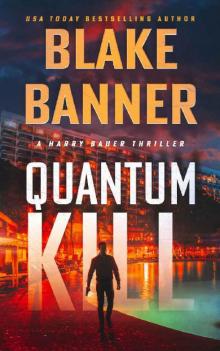 Quantum Kill (Cobra Book 4)
Quantum Kill (Cobra Book 4) Dead Cold Mysteries Box Set #1: Books 1-4 (A Dead Cold Box Set)
Dead Cold Mysteries Box Set #1: Books 1-4 (A Dead Cold Box Set)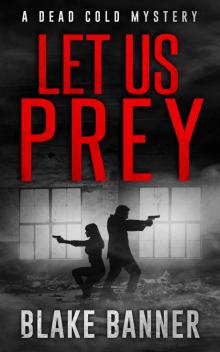 Let Us Prey
Let Us Prey Dead Cold Mysteries Box Set #4: Books 13-16 (A Dead Cold Box Set)
Dead Cold Mysteries Box Set #4: Books 13-16 (A Dead Cold Box Set)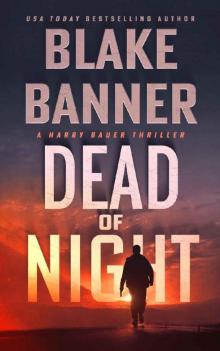 Dead of Night
Dead of Night The Butcher of Whitechapel: Dead Cold Mystery 12
The Butcher of Whitechapel: Dead Cold Mystery 12 Omega Series Box Set 2
Omega Series Box Set 2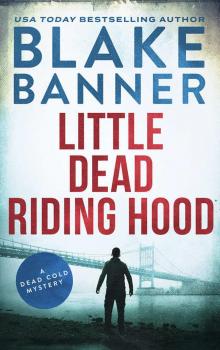 Little Dead Riding Hood: Dead Cold Mystery 13
Little Dead Riding Hood: Dead Cold Mystery 13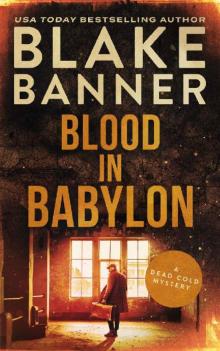 Blood in Babylon
Blood in Babylon Powder Burn
Powder Burn Kill Four
Kill Four Omega Series Box Set 3
Omega Series Box Set 3 Fire From Heaven: Dead Cold Mystery 9
Fire From Heaven: Dead Cold Mystery 9 Kill - Two
Kill - Two Omega Series Box Set 1
Omega Series Box Set 1 The Butcher of Whitechapel
The Butcher of Whitechapel Murder Most Scottish
Murder Most Scottish Dead Cold Mystery Box Set 3
Dead Cold Mystery Box Set 3 Dead Cold Mysteries Books 5-8
Dead Cold Mysteries Books 5-8 LA
LA To Kill Upon A Kiss: Dead Cold Mystery 10
To Kill Upon A Kiss: Dead Cold Mystery 10 Knife Edge (A Dead Cold Mystery Book 27)
Knife Edge (A Dead Cold Mystery Book 27) The Omicron Kill - An Omega Thriller (Omega Series Book 11)
The Omicron Kill - An Omega Thriller (Omega Series Book 11) Immortal Hate (Harry Bauer Book 5)
Immortal Hate (Harry Bauer Book 5) The Fall Moon
The Fall Moon Jack in the Box
Jack in the Box Dead Cold Mystery Box Set 2
Dead Cold Mystery Box Set 2 Dead Cold Mystery Box Set 4
Dead Cold Mystery Box Set 4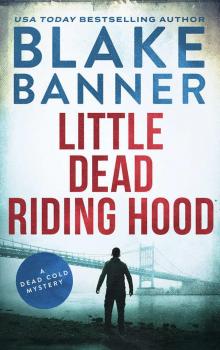 Little Dead Riding Hood
Little Dead Riding Hood Gardened of the Damned
Gardened of the Damned The Hand of War
The Hand of War Two Bare Arms
Two Bare Arms Dead Cold Mystery Box Set 1
Dead Cold Mystery Box Set 1 To Kill Upon A Kiss
To Kill Upon A Kiss Breath of Hell (Harry Bauer Book 8)
Breath of Hell (Harry Bauer Book 8) To Rule in Hell
To Rule in Hell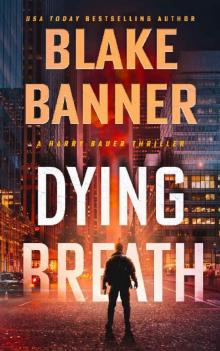 Dying Breath (Cobra Book 2)
Dying Breath (Cobra Book 2) A Harvest of Blood - An Action Thriller Novel (Omega Series Book 5)
A Harvest of Blood - An Action Thriller Novel (Omega Series Book 5) A Harvest of Blood - An Action Thriller Novel
A Harvest of Blood - An Action Thriller Novel Ace and A Pair: A Dead Cold Mystery (Dead Cold Mysteries Book 1)
Ace and A Pair: A Dead Cold Mystery (Dead Cold Mysteries Book 1) Omega Series Box Set 3: Books 8-10
Omega Series Box Set 3: Books 8-10 Kill One_An Action Thriller Novel
Kill One_An Action Thriller Novel The Storm
The Storm Double Edged Blade
Double Edged Blade Kill: One - An Action Thriller Novel (Omega Series Book 7)
Kill: One - An Action Thriller Novel (Omega Series Book 7) The Storm - An Action Thriller Novel (Omega Series Book 3)
The Storm - An Action Thriller Novel (Omega Series Book 3) Double Edged Blade - An Action Thriller Novel (Omega Series Book 2)
Double Edged Blade - An Action Thriller Novel (Omega Series Book 2) Dawn of the Hunter
Dawn of the Hunter Dawn of the Hunter - An Action Thriller Novel (Omega Series Book 1)
Dawn of the Hunter - An Action Thriller Novel (Omega Series Book 1)